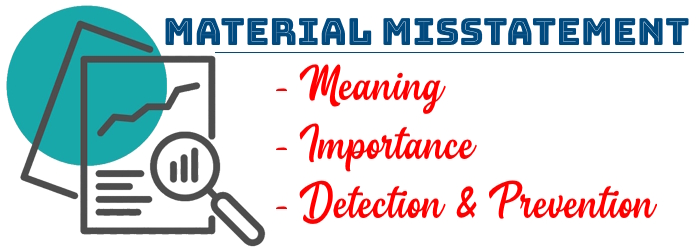Material Misstatement in Financial Reporting: Importance, Detection, and Prevention
Accurate financial reporting is crucial for maintaining transparency and ensuring the trustworthiness of businesses and organizations. However, there are instances where financial statements may contain errors or misstatements that can have a significant impact on the decision-making process of users relying on that information.
Material misstatement is a term used in accounting and auditing to describe errors or omissions in financial statements that could potentially affect the decisions of users. This article delves into the concept of material misstatement, its importance in financial reporting, and the measures taken to mitigate its occurrence.

Table of Contents
Defining Material Misstatement
Material misstatement refers to errors, omissions, or inaccuracies in financial statements that could influence the judgment or decision-making of users. The term “materiality” refers to the magnitude of an error or omission that would affect the judgment of a reasonable person relying on the financial statements.
In other words, if the misstatement has the potential to alter the economic decisions of users, it is considered material. Materiality is a subjective concept and can vary depending on the circumstances and the nature of the financial information involved.
Importance of Material Misstatement
Financial reporting plays a vital role in providing users with accurate and reliable information about the financial health and performance of businesses and organizations. Among the various aspects of financial reporting, the importance of material misstatement cannot be overstated. Material misstatement refers to errors, omissions, or inaccuracies in financial statements that have the potential to significantly impact the decision-making process of users.
Ensuring the accuracy and reliability of financial information is crucial for maintaining transparency, building trust with stakeholders, complying with regulatory requirements, facilitating informed financial decision-making, and safeguarding the integrity of the reporting process. Lets explore the importance of material misstatement in financial reporting and the measures taken to detect and prevent its occurrence.
User Reliance
Financial statements serve as a primary source of information for investors, creditors, regulators, and other stakeholders. Users rely on these statements to make informed decisions regarding their investments, lending, and business relationships. Material misstatements can mislead users and result in incorrect conclusions, leading to uninformed decisions. Accurate financial reporting is essential for users to have confidence in the financial information provided.
Transparency and Accountability
Material misstatement undermines the transparency and accountability of financial reporting. It is essential for organizations to present a true and fair view of their financial position and performance to maintain trust with stakeholders. Misstatements can erode this trust, damaging the reputation and credibility of the organization. By ensuring accurate financial reporting, organizations demonstrate their commitment to transparency and accountability.
Legal and Regulatory Compliance
Companies are required to adhere to accounting standards and regulations set by relevant authorities. Material misstatement can lead to non-compliance with these standards, which may result in legal consequences, penalties, or fines. Compliance with reporting standards helps ensure consistency and comparability among financial statements, allowing users to make meaningful comparisons. Material misstatement can not only lead to financial losses but also legal and regulatory issues for the organization.
Financial Decision-Making
Users rely on financial statements to assess the financial health, profitability, and liquidity of an entity. Misstatements can distort these metrics, leading to flawed decision-making. Investors may overvalue or undervalue a company, creditors may misjudge creditworthiness, and potential business partners may misinterpret the financial viability of an entity. Accurate financial reporting is essential for users to make informed decisions regarding investments, credit extensions, and other financial arrangements.
Stakeholder Trust
Material misstatement can significantly impact the trust and confidence that stakeholders have in an organization. Financial statements are a reflection of an organization’s financial health and performance. When stakeholders, such as shareholders, employees, and customers, discover material misstatements, it can shake their confidence in the organization’s management and integrity. Maintaining stakeholder trust is vital for the long-term success and sustainability of an organization.
Detecting and Preventing Material Misstatement
To ensure the accuracy and reliability of financial statements, various measures are taken to detect and prevent material misstatement:
Internal Controls
Implementing strong internal controls is crucial in reducing the risk of material misstatement. These controls include segregation of duties, proper authorization and approval processes, and regular monitoring and review of financial transactions. Internal controls provide assurance that financial information is accurate and reliable.
Independent Audits
External audits play a vital role in detecting material misstatements. Independent auditors thoroughly examine financial statements, assessing the adequacy of internal controls and verifying the accuracy of reported financial information. They express an opinion on the fairness of the financial statements, providing users with an independent assessment of reliability.
Professional Skepticism
Auditors and financial professionals must maintain a skeptical mindset when analyzing financial information. They should critically evaluate the information provided, question assumptions, and perform thorough testing to identify potential misstatements. Professional skepticism helps to mitigate the risk of overlooking material misstatements.
Materiality Assessment
Organizations and auditors perform materiality assessments to determine the threshold beyond which misstatements are considered material. This assessment takes into account the nature of the financial information, the size and characteristics of the entity, and the needs of the users. By setting appropriate materiality thresholds, organizations can focus on reporting information that is relevant
Conclusion
Material misstatement poses a significant risk to the accuracy, reliability, and trustworthiness of financial reporting. The impact of misstatements can have far-reaching consequences on the decision-making process of users, leading to uninformed judgments and financial losses.
Detecting and preventing material misstatements requires a combination of robust internal controls, independent audits, professional skepticism, and effective materiality assessments. By ensuring the accuracy and reliability of financial statements, organizations can maintain transparency, accountability, and stakeholder trust in their reporting practices.


